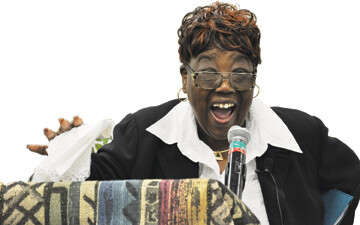
Hope is alive in Baltimore
In May 2008, United Methodists adopted a strategic plan to deliver hope to the city of Baltimore. Close to 100 people, who each have a spiritual
investment in the city, gathered recently to celebrate how that hope is now coming to life.
“God is on the move in Baltimore City and in the Baltimore-Washington Conference,” Bishop John Schol told those at the urban convocation Sept. 18 and 19 at the Maritime Institute in Linthicum. “Hope is alive because of the way you allow God to be in you and work through you.”
 Inviting the participants to retell the story of Joseph, whose dreams had the power to redeem a nation, the bishop also shared his own experiences in urban ministry of building 24 affordable town homes and a 50-unit senior citizen residence in Philadelphia. He told those present that their ministry will be hard work. It’s also exhilarating work that requires people to be innovative, creative, hopeful, smart, determined, and prayerful, he said.
Inviting the participants to retell the story of Joseph, whose dreams had the power to redeem a nation, the bishop also shared his own experiences in urban ministry of building 24 affordable town homes and a 50-unit senior citizen residence in Philadelphia. He told those present that their ministry will be hard work. It’s also exhilarating work that requires people to be innovative, creative, hopeful, smart, determined, and prayerful, he said.
“You are the Josephs for us here in the Baltimore-Washington Conference,” Bishop Schol said. “God wants to do great things through all our Josephs and Josephines. God believes in you, God hopes in you. God wants nothing but the best for you.”
He invited those present to have the audacity to believe and to dream. It’s an invitation that the Rev. C. Anthony Hunt believes the 46 churches in Baltimore are beginning to accept.
“This has been a year for the implementation of hope,” said Hunt, the superintendent of the Baltimore Metropolitan District. “There is still work to be done. But if we’ve embraced one lesson over the past year it’s that the church doesn’t exist for itself. It exists in the community and for the community. …Vision takes time, but we’re committed to transformation. We’re working toward hope.”
Within the city last year, the churches of the Baltimore region increased their worship attendance. In addition, nine communities of Shalom were created to focus on community empowerment and transformation, and four others are in the training stage. John Wesley UMC moved its worship to a tent outside its doors; Monroe Street UMC is ministering to children at risk; the Manna House, Carpenter’s Kitchen,
and the Susanna Wesley House are caring for the poor and hungry; and a number of unique initiatives and partnerships with the Board of Child Care, Wesley Seminary, city schools and other groups are
being created.
At the convocation, the Rev.Alfreda Wiggins of John Wesley UMC preached on the prophet Nehemiah who rebuilt the walls of Jerusalem. He was able to rebuild the walls because “the people had a mind to work,” she said, encour-aging those present to not try to do ministry alone, but to network and cooperate in their efforts.
“We’ve got to depend on each other,” said Wiggins. “When we leave this convocation we’ve got to go back to Chase Street, Edmondson Avenue, Wildwood Parkway, Baker Street, Turner Station. … There are people dying on our streets. We can not make ourselves content with singing and preaching and shouting. Our work begins on Monday. It’s not about getting happy on Sunday and not doing something on Monday.”
Those present rose to their feet as Wiggins reminded them that Nehemiah’s wall was not in the temple. “The wall was out there,” she said. “Hope for the city is not inside the temple. It’s not inside the church.”
Conquering the sometimes overwhelming needs and challenges caused by poverty, drug addiction, high drop out rates, a poor health care system, crime, and an array of other social ills feels almost impossible at times, warned the Rev. Albert Mosley, the chaplain at Johns Hopkins University.
“And you’re right. Each and every person who serves in the city is facing giants.” But like David fighting Goliath, when we know the battle is not ours, but the Lord’s, God delivers a victory, Mosley said. “God shows up and does what he’s known best for doing – opening a door and making a way for us out of no way.”
The Rev. Wanda Duckett of Monroe Street UMC knows this is true. Her church does not have the money it needs, nor the people to do all the necessary work in ministry. “But we do have hope,” she said. “Jesus is our hope.”
It was Duckett’s wish that people would leave the urban convocation “inspired to do what they thought they couldn’t – to literally redeem the dream.”
“This is ultimately about creating God’s Kingdom,” Hunt said. “That provides infinite possibilities.”

Login/Register to leave comment